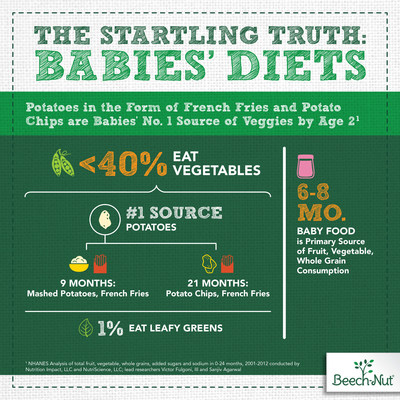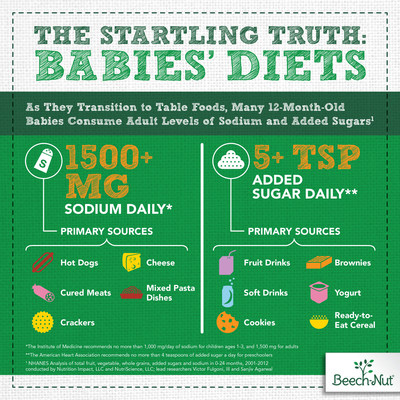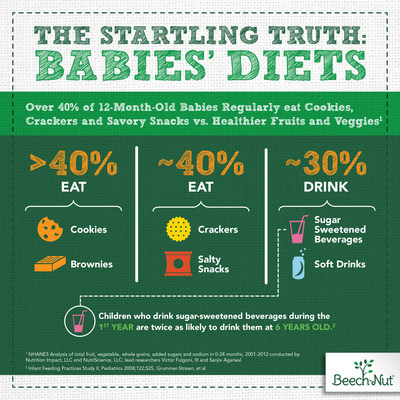

SAN DIEGO, April 6, 2016 /PRNewswire/ -- New research presented today at Experimental Biology reveals startling facts about what babies are eating during their most formative years. The study1, which analyzed 11 years of food and beverage consumption data among babies 0-24 months in the U.S., shows that on any given day only 40 percent of babies are eating vegetables, and most get only about one-third the recommended amount of whole grains.

Furthermore, the analysis, taken from the National Health and Nutrition Examination Survey (NHANES), shows that as infants transition from baby food to whole food at around nine months, there is a significant increase in sweets, salty snacks and sugar-sweetened beverages. By 12 months, infants and toddlers are consuming more than 5 teaspoons of added sugar* and more than 1500 milligrams of sodium** a day (which is the recommended limit for adults).
Beech-Nut Nutrition Company, one of the country's leading baby food makers, commissioned the study to better understand early childhood eating patterns and raise awareness of the need for more efforts that support parents in helping their babies build an authentic, joyful relationship with real food.
"Mounting evidence shows that what children eat in the first two years of life is critical to obesity prevention and long-term good health, which makes what we've found in this analysis that much more concerning," said Victor Fulgoni III, PhD, Senior Vice President of Nutrition Impact and lead researcher on the NHANES analysis. "It is clear we need strategies that squarely focus on that critical transition period."
Study Facts at a Glance:
Intake of fruits, vegetables and whole grains increase during the 6-8 month "baby food" window (baby food is the primary source of these food groups). But babies' diets start to become imbalanced around the nine-month mark and by 12 months here is how their diet breaks down on any given day:
Evidence-Based Implications of Infant Nutrition
A comprehensive review of over 50 peer-reviewed, published studies2, also presented at Experimental Biology, reveals that there is a likely relationship between early infant feeding and obesity risk. The studies showed that, consistently, the top sources of calories among infants and toddlers - after milk and formula - are 100% juice and sugar-sweetened beverages.
In fact, The Infant Feeding Practice Study II3 showed that children who drink sugar-sweetened beverages, such as soda or sugar-added juice, during the first year of life are twice as likely to drink these types of beverages at 6 years of age; and children who rarely eat fruits and vegetables during the first year of life are more likely to continue this pattern of rarely eating fruits and vegetables at 6 years of age.
"Some of the data that really stuck out to me was that babies do get a more balanced diet with baby food, but there is still work to be done there as well," said pediatric nutrition specialist Nicole Silber, RD, CSP, CLC. "I see an opportunity to extend that 6-8 month time period to really focus on getting babies to enjoy, even begin to seek, fruits and vegetables with vibrant colors and flavors so that they build a long-term relationship with these foods."
A Critical Challenge: No Official Dietary Guidelines for Children Under 2
Currently, the U.S. Dietary Guidelines for Americans begins at age 2, and efforts are underway to include babies 0-24 months in the 2020 Guidelines. Absent of these, Silber stresses the importance of helping to guide parents in the right direction in any way possible.
"Parents always have their children's best interests at heart, but figuring out what to feed babies can be challenging," says Silber. "We need to get more education and creative ways to help parents be successful in building their babies' love of real, nutrient-rich foods."
1 NHANES Analysis of total fruit, vegetable, whole grains, added sugars and sodium in 0-24 months, 2001-2012 conducted by Nutrition Impact, LLC and NutriScience, LLC; lead researchers Victor Fulgoni, III and Sanjiv Agarwal
2 Literature analysis of 50 publications over last 10 years conducted by NutriScience LLC and Nutrition Impact, LLC; lead researchers Sanjiv Agarwal and Victor Fulgoni, III
3 Infant Feeding Practices Study II, Pediatrics 2008;122;S25, Sara B. Fein, Laurence M. Grummer-Strawn , et al
* The American Heart Association recommends no more than 4 teaspoons of added sugar a day for preschoolers and 6 teaspoons for adult women
** The Institute of Medicine recommends no more than 1,000 mg/day of sodium for children ages 1-3, and 1,500 mg for adults
About The Studies
The NHANES analysis and literature review were conducted to identify the dietary patterns among infants 0-24 months of age in the U.S. and reinforce the need for official guidelines based on growing science-based evidence of those patterns on long-term habits and health. Beech-Nut enlisted globally recognized researchers known for their expertise in nutrition data analysis to conduct and present the studies at Experimental Biology.
About Beech-Nut
Producing baby food since 1931, Beech-Nut Nutrition Company has been built on a history of innovation and dedication to infant nutrition. Headquartered in Amsterdam, New York, Beech-Nut is the number two leading baby food brand in the United States and is committed to deliver more nutrition for parents and babies. As a subsidiary of Hero AG of Lenzburg, Switzerland, a global leader in consumer goods and infant feeding, Beech-Nut is able to combine global resources to continuously improve food and nutrition for infants.
About Nicole Silber, RD, CSP, CLC
Nicole is a Registered Dietitian and a Certified Lactation Counselor specializing in pediatric nutrition. She is in private practice in New York City and is a Pediatric Nutrition Expert contracted by Beech-Nut Nutrition Company. Nicole worked as a clinical nutritionist at The Morgan Stanley Children's Hospital of New York-Presbyterian/Columbia University and NYU Langone Medical Center/Fink Children's Ambulatory Care Center. She has managed the nutrition of critically and chronically ill children, pregnant and breastfeeding women, children with feeding tubes, gastrointestinal disease, prematurity, cystic fibrosis, cardiovascular disease, food allergies, diabetes, picky eating, underweight and obesity.


Photo - http://photos.prnewswire.com/prnh/20160406/352092-INFO
Photo - http://photos.prnewswire.com/prnh/20160406/352126-INFO
Photo - http://photos.prnewswire.com/prnh/20160406/352127-INFO
SOURCE Beech-Nut